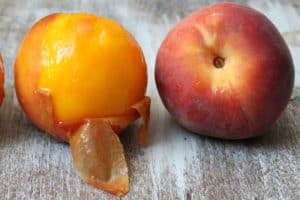Oranges are awesome. They’re easy to take on the go, are delicious, refreshing, hydrating, and are very good for you! But can you turn orange from oranges?
You won’t turn orange from too many oranges because there isn’t enough beta carotene in them. Beta carotene is a yellow/orange pigment that helps give fruits and vegetables their rich colors. Your skin can turn orange, however, from eating too much carrot or pumpkin because carrot and pumpkin have very high amounts of beta carotene.
Read on to learn more about can you turn orange from oranges?
Can You Turn Orange from Oranges?
There is about ten times more beta carotene in carrots than any other food source. Pumpkin, sweet potatoes, and squash are also high in beta carotene. Oranges do have beta carotene in them, but nowhere near enough to turn your skin orange by eating a lot of them.
The discoloration of the skin from eating too many carrots is a condition called carotenemia, also referred to as carotenosis. Carotenemia makes the skin a more yellowish-orange rather than a deep orange. It does not cause yellowing of the eyes, unlike jaundice. It is usually seen in younger children when they start eating solid food, like mashed carrot, but it is harmless and does not lead to other health issues.
On a similar note, if you eat too many tomatoes, you can get lycopenemia, which gives a similar yellowish-orange discoloration of the skin. This is caused by an accumulation of lycopene in the skin tissues.
Treatment for carotenemia is simply to go on a low-carotene diet, but it can take a long time, sometimes several months, for the skin to go back to normal.
So if oranges don’t turn your skin orange, can you still eat as many as you like?
Health Risks of Too Many Oranges
Oranges have many health benefits but should be eaten in moderation. One of the biggest problems is too many can lead to great discomfort. A large amount of fiber can cause problems for your digestion and give you abdominal cramps and diarrhea.
Oranges are fairly low in calories, but eating too many of them in a day can lead to big weight gain. You can also have way too much vitamin C (more than the recommended 2,000 mg a day). Too much vitamin C can give you heartburn, nausea, cramps, insomnia, or even kidney stones.
Oranges are also a high-acid food, so they can cause some painful heartburn, especially for anyone who regularly experiences heartburns. People who suffer from GERD (gastroesophageal reflux disease) should definitely avoid overeating oranges as this can lead to very painful heartburn or even regurgitation.
People who take beta-blockers should also avoid eating too many oranges. Beta-blockers drive up potassium levels, but if combined with high potassium foods, like oranges and bananas, then that can be far too much potassium in the body. Excess potassium cannot be effectively removed from the body, and this can be a serious issue for anyone who has dysfunctional kidneys.
Eating too many oranges, like anything, has health risks, but what about the benefits of oranges?
Health Benefits of Oranges
Consuming a moderate amount of oranges can boost the immune system and lead to healthier skin. They are rich in calcium, vitamin C, fiber and are low in calories, so they are really one of nature’s ultimate health foods.
The high concentration of vitamin C in oranges helps your body to break down and synthesize collagen. Collagen is a protein that plays an important role in building and maintaining healthy skin. The vitamin C in oranges is also important for repairing and growing tissue in many different parts of your body. It helps wounds heal faster and maintains healthy bones and teeth.
Vitamin C also helps support and grow cartilage, tendons, ligaments, and blood vessels. Regular consumption of vitamin C may also improve recovery from hard exercise. A two-week study found that the participants who consumed 400 mg of vitamin C daily had much-improved muscle function and less muscle soreness after their exercise.
Oranges do have some beta carotene in them (nowhere near as much as carrots, so, as mentioned earlier, don’t worry about your skin turning orange from them!) The moderate amount of beta carotene in them helps your body to create and process vitamin A. Vitamin A promotes skin cell growth which keeps your skin young-looking as you grow older.
Oranges are also very high in fiber, and a high fiber diet has many benefits, including helping to regulate bowel movements, reduce cholesterol levels, maintain a healthy weight and maintain healthy blood sugar levels. A study by the Harvard School of Public Health states that fiber can lower the risk of diabetes, heart disease, and cardiovascular disease.
It also slows down digestion which makes you feel fuller for a longer period of time after eating. So for anyone wanting to cut their calories down and shed the pounds, have an orange as a snack in the day to hold you over.
One of the most recent discoveries is how oranges can reduce the risk of stroke. The consumption of flavanones, a compound found in citrus fruits like grapefruits, lemons, and oranges, has been shown to reduce the risk of ischemic strokes. Ischemic strokes happen when blood vessels become blocked and prevent blood supply to the brain. They account for 87% of all strokes.
A big study conducted at Norwich Medical School, with about 70,000 women over a 14 year period, found that women who consumed the most flavanones had a 19% lower risk of ischemic stroke. The women in the study consumed flavanones from oranges, grapefruits, as well as orange and grapefruit juice.
A less common stroke but more serious is a hemorrhagic stroke. A recent study by the American Academy of Neurology found that those who had a hemorrhagic stroke had lower levels of vitamin C, and those who did not experience a stroke had normal levels of vitamin C.
You Can Eat the Peel
Eating orange peels may seem crazy, but it also has many health benefits and adds a strong citrus flavor to many recipes, including cookies, bread, marmalade, and more. The plain peel is rather tough and bitter, and of course, not juicy like the inner pulp. When used in baking, it is cooked to make it soft, often with sugar or some other sweetener to reduce its bitter flavor.
According to the United States Department of Agriculture (USDA), if you were to eat the whole peel of an average size orange, about 100 grams worth, you’d consume about 97 calories, 25 grams of carbohydrates, 1.5 grams of protein, and 10 grams of fiber. Of course, don’t eat the whole peel though in one sitting will likely cause an upset stomach! Just take note of the many benefits found within if consumed moderately.
Orange peels also have a lot of vitamin C, with 8.2 mg in a single tablespoon, which is about 14% of your daily value. There are many other vitamins, including riboflavin, folate, niacin, thiamin, vitamin A, and vitamin B-6.
Perhaps one of the biggest benefits of orange peels is the substance found within called limonene. Limonene accounts for 90% of the citrus peel oil and may provide a potential benefit for those at risk of skin cancer.
Research published in “Nutrition and Cancer” found that those who ate the peels of citrus fruits had a far lower chance of developing squamous cell carcinoma, a common type of skin cancer. The reduction in risk may be due to a large number of antioxidants and regular consumption of limonene from the peel.
The best way to eat the peel is to cut it into small strips and add it to a salad, pasta, seafood, or any other dish. If the orange outer part is too bitter, the white inner coating of the peel, called the albedo, still contains a powerful punch of vitamin C, pectin, fiber, and flavonoids.
Zesting into your breakfast yogurt or smoothie adds a big citrus flavor, nutrients, and fiber. Just ensure to zest it into small strips and consume a moderate amount so as not to upset your stomach.
And go for oranges labeled organic only. Non-organic or “conventional” oranges will have a ton of pesticides and herbicides sprayed on them, which won’t all come off even after you wash them. Certified organic farmers only use natural control methods for pests and weeds, so they are the best choice if you’re going to eat the peel.
See the below video to learn more about carotenosis which would come from eating too much carrot or pumpkin, but not oranges:
Conclusion – Can You Turn Orange from Oranges?
So can you turn orange from oranges? You won’t turn orange from eating too many oranges because oranges lack a significant amount of beta carotene.
Beta carotene is a yellow/orange pigment that helps give fruits and vegetables their vibrant yellow or orange colors. Your skin can turn orange from eating too many carrots or too much pumpkin because carrot and pumpkin have very high amounts of beta carotene.



